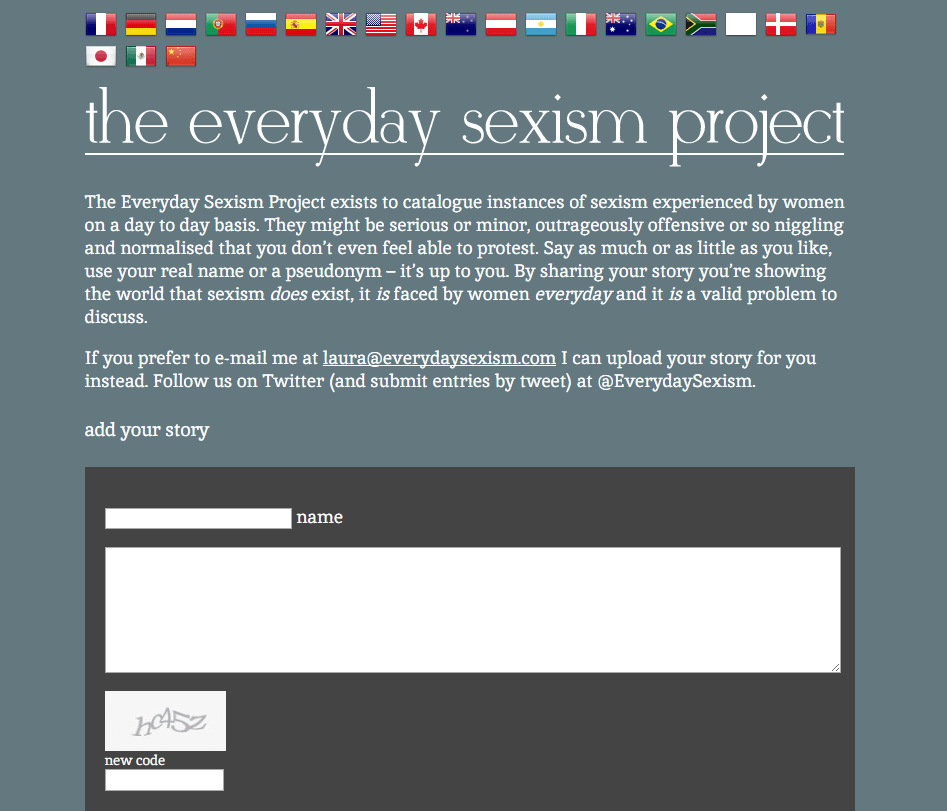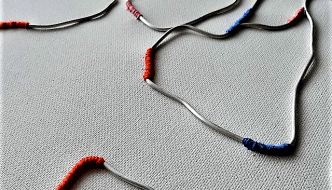Alexandra Richards introduces the Everyday Sexism Project
December 1, 2015

Source: everydaysexism.com
I read a joke on Instagram the other day that made me laugh out loud and simultaneously question everything. It went something like this,
‘And how did you meet your husband?’
‘He shouted something sexually aggressive at me from a van and we just went from there really.’
My immediate reaction was to laugh, not only because the idea is absurd, but because it is relatable. Every woman has experienced being shouted at, whistled at or obscenely gestured at by some ‘lad’ claiming that it’s all in the name of ‘banter.’ The joke was light hearted, but street harassment is not funny. Being harassed from a car window isn’t banter, it’s objectification. From the ‘gender pay gap’, to the relative lack of female representatives in Parliament, street harassment is only one indication of a much larger problem in our society; sexism remains painfully prevalent in many walks of life.
Less than a week later, one of my male friends asked me if I’d like to attend a talk on The Everyday Sexism Project, led by Laura Bates, at the University of Birmingham. Bates is a feminist writer and founder of The Everyday Sexism Project. The project ‘aims to take a step towards gender equality by proving wrong those who tell women that they can’t complain because we are equal’, the project does this by documenting stories from women all around the world. As gender equality had been weighing on my mind, I decided to see if Bates could shed some light on how to address the issue.
Bates began the project after being sexually harassed three times in a week. Deciding that she’d had enough she gathered similar stories from other women, and this ongoing collection illustrates that sexism remains a pressing issue in our society. Throughout the talk, the audience’s attention was brought to examples of sexism in everyday life through personal stories. One woman had been harassed on the bus, another had been told she ‘was on her period’ when she stood up for herself at work, the list went on.
Most disturbing were the stories about what happened after women responded to jeers. Bates talked of how quickly names like ‘darling’ or ‘love’ turned to ‘slut’ or ‘bitch’ once a woman stood up for herself in these situations. Bates herself showed examples of the abuse she has received since beginning the campaign.
Standing in front of a presentation slide filled with screenshots taken from twitter ‘trolls’ repeatedly threatening to hurt or even kill her, Bates explained that she receives abuse daily merely for speaking out against sexism. The online messages of the ‘trolls’ reveal that there may be a more troubling message that underlies many of the lighthearted jokes that are exchanged face to face every day. The abuse that Bates receives for being a feminist was used to illustrate the argument that no woman should experience silencing simply for being a self-proclaimed feminist, and nor should any man feel embarrassed to advocate equality of the sexes.
Bates talked about how gender stereotypes affect both men and women and how damaging this can be. Bates told a story that highlighted the stigma surrounding the word Feminism; visiting a primary school she had noted reticence when she asked the children whether they self-identify as feminists, yet they responded positively to ideas of basic gender equality. Bates noted that many young boys, or even young men, are reluctant to call themselves feminists for fear that it will make them appear ‘less manly’. Similarly, not wanting to be labeled as ‘aggressive’ or ‘preachy’, some women shy away from the term.
I left the talk feeling deflated yet determined. Bates showed that once we recognise the problem we can start to address it. Be it through schemes like the ‘Everyday Sexism Project,’ or on a smaller scale, calling out your friends when they say something casually sexist, it’s a snowball effect and it will grow. Even at the talk I was pleasantly surprised by the number of male faces in the audience. With celebrities like Emma Watson pushing for equality and many others speaking out on social media in recent years, it appears to me like everyday sexism is beginning to be a more acceptable topic of conversation.
However, after attending the talk and conducting my own research, I noted that there were some areas that Bates left out. As the debate surrounding Feminism opens up, it is apparent that there is more than one response to Feminism and that it is a multi-faceted issue.
Kimberlé Crenshaw’s theory of Intersectionality is a concept I came across in my research. Not a new concept, it is however one that has been addressed in recent years. Intersectional Feminism notes that women can experience oppression in a number of different ways and in varying degrees of intensity. It recognises that cultural patterns of oppression are bound together by the ‘intersectional’ systems of society. Therefore women varying in colour, class, ability and ethnicity will experience different degrees of oppression and this must be taken into account when discussing feminism in a broader sense. In much of the ‘mainstream’ representations of Feminism we see in the media nowadays we only hear a voice that represents a white, middle classed, cis gendered, able bodied point of view. This leaves the movement of feminism in danger of becoming stagnant, if only one type of feminist is represented how do we expect the problem to be solved?
To move forward, mainstream Feminism needs to represent all women from different backgrounds, races and class. Many cite Intersectional approaches to Feminist praxis as a way forward because Intersectional theory describes how different women face different intersections of struggle and oppression. Laura Bates makes the vital point that women being subjected to sexism daily is not something that society should accept. But, in attempting to rectify the issue of sexism in our society, we must remember that sexism is multi-faceted; women experience varying oppression in the same society for a number of different reasons. In the struggle for equality no voice should be louder than another.
For more on Feminism from TSOTA see:
Bobbie Hook gives her take on Manchester’s Feminist Fresher’s Fair
Filed under: Politics
Tagged with: feminism, intersectionality, lectures, sexism, talks, trolling, university of birmingham



Comments